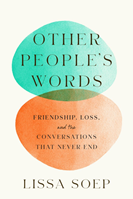Other People's Words: Friendship, Loss, and the Conversations That Never End
April 11, 2024
In her deeply personal exploration of grief, Lissa Soep examines how the words left behind by our departed loved ones continue to influence us.
 Other People's Words: Friendship, Loss, and the Conversations That Never End by Lissa Soep, Spiegel & Grau
Other People's Words: Friendship, Loss, and the Conversations That Never End by Lissa Soep, Spiegel & Grau
In 2011, a man named Itaru Sasaki opened a “Wind Phone” in Ōtsuchi, Iwate Prefecture, Japan. It’s an unconnected telephone booth where people could talk to deceased family and friends, which helped Itaru himself after losing his cousin. Since its opening, the Wind Phone has been used by more than 30,000 people, updated at least once, and recreated countless times. It’s one of the many ways we might try to reconnect with our loved ones; we might also revisit old letters, emails, and texts, listen to old voicemails, contact a medium, or try and connect with a higher power. Sometimes, it even feels like we get a response. If we continue to converse with those who have passed on, is death really the end?
In Other People’s Words: Friendship, Loss, and the Conversations that Never End, Lissa Soep considers the ghosts in our language. Her intimate and emotional memoir details her experiences with grief following the deaths of two close friends. One friend, Jonnie, died suddenly and accidentally, leaving a family behind, whereas the other, Christine, passed after a long battle with illness and a messy breakup. Using writings and concepts from Mikhail Bakhtin, a Russian philosopher and critic, as well as anecdotes from his interactions with others in his academic circle, Soep considers the ways our loved ones stick around after they die, and the way our words never truly belong to us.
One of the conversations that plays out in Other People’s Words takes place in the margins of Soep’s copy of Dialogic Imagination by Bakhtin. She got the book with annotations from her friend Mercy, annotated it herself as she worked on her dissertation, then reannotated it as she and her friends coped with Christine’s cognitive decline. Through this process, the book had been transformed into something more than the knowledge it contains. It became a conversation between two different people at three different times, presented timelessly and without delay in response. It makes me think about the way I seek out textbooks secondhand, both for the cheaper price and for the annotations from an unknown student. I love the advice they give, the comments they make, and I love responding to them before I resell the book myself, sending our commentary off to another student in our position.
Another thing Soep notes is that we do not truly learn language from the dictionary. Rather, we learn it from other people—family, friends, and professors, in conversations, speeches, poems, textbooks, and novels. In this way, our words are never our own—our speech is inherently shared with those we learned it from. This allows us to see a monologue as a dialogue with ghosts, which is remarkably clear when we use words and phrases from those who have passed on. At one point, Soep writes about a time when Mercy lectured about an Adrienne Rich poem in the exact way that Christine, Mercy’s ex, would have done. In that moment, Christine was back in the classroom with her with devastating clarity.
Reading Other People’s Words has made me think deeper about the words I use day to day. I’m fond of the phrase “Much to think about”; I picked it up from a friend online and began integrating it into my regular conversations. I’ve noticed some of my friends and family have started to use the phrase as well. At first, it seemed ironic, a deliberate reference to the way I say it. However, enough time has passed, and now the phrase is simply a part of their daily lexicon. In a similar manner, since meeting my partner, I’ve noticed my spelling of “okay” in texts gradually change to “okie”, the way he spells it. It’s a subtle change, but I think of him every time I write it.
Soep pays special attention to the art everywhere in our language. She considers what is said and unsaid, the multiplicity and simultaneity in our speech. She expertly narrows long and winding conversations into straightforward meaning, while also expanding short texts and emails to contemplate what isn’t there and why, a process I see as poetic. She also picks apart translations of Bakhtin’s work, analyzing specific word choices and evaluating how meaning changes at such a minute level.
Because of Soep’s consistent, thorough care for language, Other People’s Words takes on a beautiful, sentimental quality, at times morose and at others hopeful. While the book is centered on grief, it is not disheartening; it instead shows that we keep our loved ones with us forever, and contends that we should not despair, but rather continue to love.



